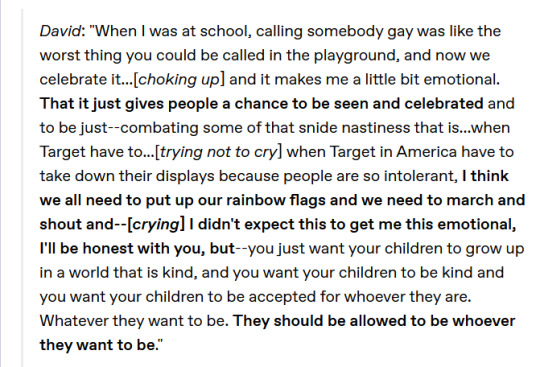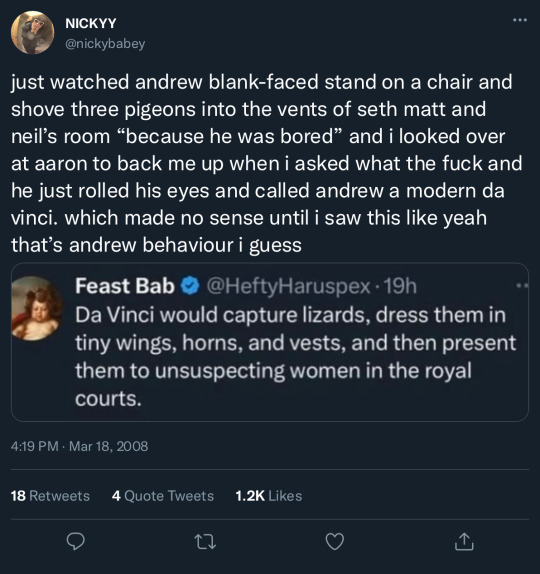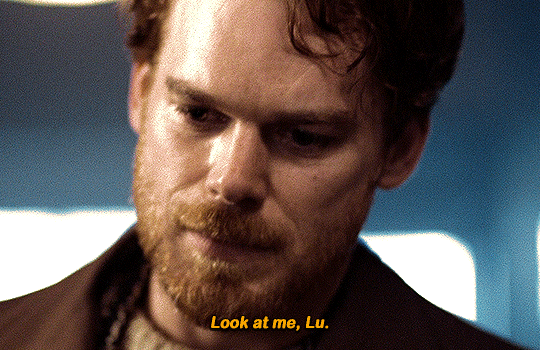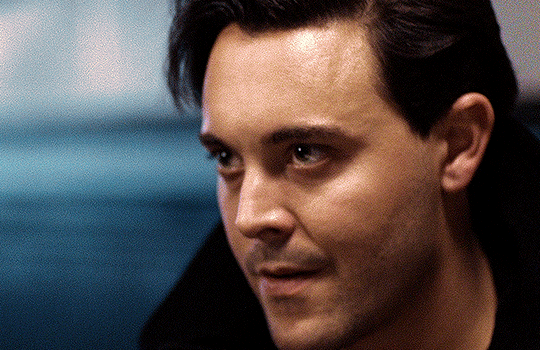#david reason
Explore tagged Tumblr posts
Text


"We've all got to be fighting that fight every day."
Happy Pride, everyone...
#david tennant#soft scottish hipster gigolo#reasons to be cheerful#some people hold up a rainbow flag. David Tennant turns himself into one.#David and Michael are both tremendous LGBTQ+ allies#but i think they understand that pain on a personal level#love seeing him become so much more comfortable in his own skin#and we can see the change in him on the inside and outside#let people be who they are#happy pride month indeed#<3
36K notes
·
View notes
Note
I have been a mimic disliker but man you have worn me down
Life was cruel to them 💔
I am starting to like them a bit now so great job


THE MIMIC’S STORY IS GOOD I PROMISE YALL,,
#ask reply#my propaganda for the mimic is working ..#though genuinely I think the mimics whole deal is peak#William isn’t a sympathetic villian#but the mimic is#William didn’t care or love his family least not in a normal way his own twisted ver of ‘love’#but the mimic genuinely loved their life before with Edwin and David#the mimic misses David has this whole crash out cause they miss em#the post the mimic does with their arm is them mimicking David holding a plushie#again I hope SOTM really sticks the landing with showing off the mimic#that they are scary and tragic#I actually love the contrast with William and the mimic#William is human but is evil without reason lacks empathy and love#while the mimic is a robot but was loving and their lost of innocence fuels their vengeance#it’s really good I love you mimic
2K notes
·
View notes
Text

So. About that new episode huh
#learning that ‘I remember you’ only existed bc they wanted Ice King to cover the fries song#but they needed a reason for he and marcy to interact was so.#fionna and cake#adventure time#simon petrikov#ice king#the winter king#brian david gilbert
14K notes
·
View notes
Text

the moment kayleigh told wymack that was indeed NOT the baby daddy
#my wymack and kevin designs are identical for comedic reasons#HE JUST WANNA BE A PAPA#bedtime sketch#digital art#all for the game#aftg fanart#aftg#digital painting#kevin day#david wymack#kayleigh day
642 notes
·
View notes
Text







I was getting a little scared that I was gonna let you leave here without us having done that. So, thank you for making that happen for us.
@pscentral event 39: pride -> favourite first kiss
#schitt's creek#schittscreekedit#david rose#patrick brewer#david x patrick#*#userholtz#tuserheidi#userdavid#useraudrey2#tusermona#quicklings#swearphil#usertj#singingprincess#usersadie2#tuseruta#i had to scrap like 5 gifs to make this gifset reasonably short#not pictured: them just smiling at each other saying nothing#if I make another gifset of this scene…well#the nervouseness of this scene before they actually kiss is so good#like yeah patrick just say whatever <3#cant believe theyre husbands!!±
416 notes
·
View notes
Text

#David Harbour#i made this for one reason and one reason only#wish the quality wasn't like dogwater#but i can see it clearly enough#don't mind me this is just a personal gif for me
1K notes
·
View notes
Text

insomnia
#broadchurch#alec hardy#david tennant#my art#a sketch I took too far for some reason#ended up finding Hardy's entire house floor plans and had to mirror the drawing because of it#even tho nobody would have cared but it was bothering me and now his hair flops to the other side and you know I'll stop typing it's fine
583 notes
·
View notes
Text










pt.49!! <pt.48 pt.50>
last text is from andrew’s phone if that wasn’t clear
EDIT I FORGOR THE TAGS IM SORRY HOMIES
@andrewsleftarmband @blurryhour @you-know-i-get-itt @notexactlythatgirl @longspacerat @tessasilverswan @minyard-05 @carbon-dated-gal @bisexualchaosdemon @stormiiflies @watercoloureyes01 @vampire-overlord @iron-sides @azure-wing @buffalo-fox @ohgodnotagainplease @pink-hydrangea @jaywalkerss @ohmynoggin-blog @cosmic-marauder @min-getoutofmy-yard @plazybones @disastersappho @leestars13 @the-witch-forever-lives @minyardsss @post-historical-posts @andabuttonnose @hidinginmyhands @aftg4l @allfor-thegames @kaleidoskuls @inafieldofstarflowers @snowcoming @mooniism @jeanmoreausautismstickers @prometheusthedragon @graveyardviolence @bustedleftshoe @beatrix33 @aftg-bs @yes-i-exist-shutup @milktemproom
#the kevjean is solely for the bit im afraid. but i do enjoy the bit#kevin will be taking a string of Ls in the next handful of these for no particular reason#anyway katelyn and seth besties and i mean this in a middle school girl best friends way that you don’t recover from until your 20s#aftg#aftg socmed au#kevin day#neil josten#jean moreau#cat alvarez#katelyn mackenzie#aaron minyard#seth gordon#dan wilds#david wymack#matt boyd#nicky hemmick#aftg social media au
640 notes
·
View notes
Text









Yes! Oh, that came out a bit quick.
David Tennant as the 10th Doctor for @too-funky✨
#david tennant#tenth doctor#doctor who#dwedit#he really had the nerve to say that in all seriousness with the way he flounces around lmao#but hey it always worked and for good reason 😉#as always sending every bit of love your way and hope this adds to an incredible day 🥳💖#🎈🎈🎉#dtennantedit#ten#dianagifs
1K notes
·
View notes
Text
incorrect blood blossom au quotes
-------
Danny, as nightingale: *making horrific noise bombs* Nightingale: if i use this audio of the sun, reverse it, reverse it again, then layer it on top of these reconstructed dinosaur growls, and then drop the pitch, i can almost replicate the noise of a leviathan in the deep end of the zone :) Nightingale: some circles call this "psychological" warfare Nightingale: i call it a highly effective brown note
----------
Once Bruce's gimmick villains start popping up: Danny, gripping Bruce by the shoulders: Buzz. Buzz. listen to me. listen. Bruce: Danny: monologues? fuckin' wORK. you gotta let 'em monologue.
-----------
Bruce: you incited a prison riot? Danny: you assaulted a police officer? Bruce: Danny: Bruce, trying not to smile: Bruce: actually, i assaulted three Danny, failing at trying not to smile: and i incited several
------------
Danny talking about cujo: —he’s a good dog! Bruce: im sensing a ‘but’ here Danny: ....you’re right there is a ‘but’ Bruce: hm. Danny: but, you know how ghosts have powers? Bruce: im assuming the dog has ghost powers. Danny: m. Mhm. he can become the size of a bus Bruce: … a h
---------
Bruce: wait. pause Danny, was about to drop Dad Lore on Bruce: Bruce: is this another horrifying thing from your childhood that im about to hear? Danny: Danny:…yeee..es? Bruce: *wearing the face of a man mentally preparing himself for whatever fucked up shit danny’s about to spit out of his mouth* hn Bruce: carry on
----------
Nightingale: be the karma you wanna see in the world. Nightingale: with a few tranquilizers, a slingshot, and some red paintballs, you too can trick the mob into thinking that they've been shot by Batman's sniper from hell! Nightingale, winking: they're not totally wrong about it either!
------------
Nightingale: I cant kick people in the face anymore thanks to the bone-eating poison Superman: the what- Nightingale: so i do the next best thing, and enact psychological warfare on Bat's enemies instead.


#danny fenton is not the ghost king#dpxdc#dpxdc crossover#blood blossom au#dpxdc au#gotta love bruce and danny. nothing says father-son bonding like traumatizing the gotham underground#had the brilliant idea of making danny a ranged fighter in blood blossom thanks to his whole *gestures* everything. and im running with it.#congrats gotham you have now received: a traumatized 14 year old with deadly aim and a vicious protective streak made 10x worse#good luck babe! he might not break your bones like batman will but he will knock out half your guys and take the other half to hell :]#dont be the reason batman's emergency support steps in. its not worth it <3#danny is so [hayloft opening] to me. he's standing in the doorway ominously illuminated in light and menacingly swinging his slingshot#joking joking. he doesnt drop down :]#before the underground find out that nightingale's name is nightingale they call him 'snipe'#the fact he doesn't show up 100% of the time puts them on extra edge#nightingale as the emergency support has two jobs: Make Them Regret. and then distract em long enough for Bat to get back into the game#danny aboutta david and goliath a bitch
488 notes
·
View notes
Text

"I don't like how they turned them gay in season 2. Why does everything need to be gay?"
Ah, yes, Season 1 Crowley was so bloody straight
I look at my mates like this every other Wednesday afternoon when they acting cute
So straight
No horny
This expression does not mean "Stop being fucking cute before I tackle you to the floor and rail you until I get 6 thousand years of pent-up energy out of my system", no. Crowley is thinking about tea and daisies
#good omens#crowley#aziraphale#ineffable husbands#anthony j crowley#aziracrow#david tennant#i apologize to ace aziracrow members once again#for legal reasons this is a joke
825 notes
·
View notes
Text





📚 Crowley + holding stacks of books 📚
#for some reason he's just walking and holding those stacks of books and then just throws them away#idk why or whats the purpose of that but i love it? chaos king#crowley#good omens#good omens spoilers#goedit#goodomendedit#gomens#gomensedit#david tennant#ineffable husbands#mine#gif:good omens#good omens 2#go s2 spoilers#good omens s2 spoilers
6K notes
·
View notes
Text
Cass' love language is indeed tactile and touch and it particularly manifests in hugging and embraces - thinking of how touchy Steph is in her death visions, the way Cass touches Bruce after their fight, Bruce's hug when he adopts her, the various Babs-Cass hugs and the way Cass touches her when they reconcile after their fight (which is very similar to the Bruce post-fight touch as well). Even in New 52, Cass sees two people hugging and tries to replicate it. Hugging represents love and connection in every iteration of her character. But at the beginning of it all is a little girl who has just killed for the first time, staring at the person she loves most in the world waiting with open, welcoming arms - and she runs away.

#cassandra cain#got david cain on my mind today... oh david i wish you were dead but also i wish you were alive so you'd be in cass stories#look at him. look at the way he's smiling. look at his open arms#this was the last glimpse of david cass had for years and years. does she think about this moment often?#when she tells bruce that david never held her is she thinking about this moment too?#isbvdibbkb look the n52 origin was bad for many reasons but that hugging stuff is also so lajdbvlSKBVjb#also how bruce and cass' relationship is filled with very tender touches... that moment when they touch each other's face and turn away#and in new 52 their FIRST interaction being a hug#cass and fatherhood is so LDUBLKB I'M GOING TO BE SICK
278 notes
·
View notes
Text
i don't think twilight is buff. like, i bet he's fit. toned, perhaps. but like, super chiseled? no. working out to have a ton of definition is a lot different than working out to maximize strength and agility, which is what i think he does.
#this is a part of my theory that ancient peoples were not all washboard ab possessed gods#“but they were always doing manual labor”#yeah they were too busy working to survive to work on defining their delts bro#the statue of david does not look like a professional bodybuilder for a reason#anyway#unpopular opinion#sxf#spy x family#loid forger#spyxfamily
479 notes
·
View notes
Text

Finally managed to record a bit of David at curtain call 😍
Brilliant seeing this incredible production once again - and getting to see what's different and what isn't 🥹🥰
(Please don't repost ☺️)
#david tennant#west end macbeth#macbeth#Completely failed to record my own videos at the Donmar#since I couldn't get myself to just hold up a camera in their faces rather than joining in on the clapping#so also didn't record the whole thing this time but at least a bit of it ❤️#and ah the handle is from twitter 🙈#also I really need to learn to make better gifs and/or video edits because the quality definitely looks better on my phone than this 🙈#Edit: Looks like he has tried not to kick as high this week from what I have seen 🥺#I hope that's just random and not because they saw the photos and videos and were like maybe try not to show too much#Because my main reason for uploading this was just that he's absolutely adorable and such a delight to watch 🥹#and it's not like there's actually anything to see besides the shorts and his knees which are on full display throughout anyway#and will probably be on display for the filmed version as well#So hope it's just that either I haven't seen any videos from the same angle or it's just random how he ends up doing it#please keep up with the cute twirl and kick DT ❤️
758 notes
·
View notes
Text












KILL YOUR DARLINGS (2013) dir. John Krokidas
#kill your darlings 2013#kill your darlings#the beat generation#adaptationsdaily#period#perioddramasource#usermicky#userjl#cinemapix#cinematv#fyeahmovies#filmtvtoday#mlmedit#lgbtedit#lgbtq film#gifs*#dane dehaan#daniel radcliffe#lucien carr#allen ginsberg#jack kerouac#david kammerer#smoking tw#everyone like 👀👀#my fixation on this movie goes dormant and then winter comes and it returns with a vengeance for some reason
441 notes
·
View notes